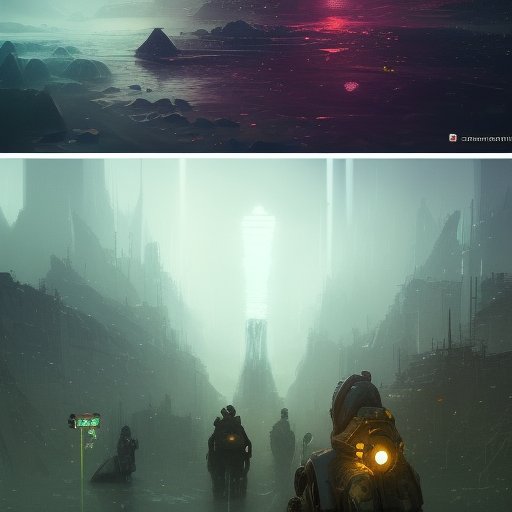
Imagine a world where you could create your own reality. A world where you could program your dreams and live them out with immersive technology. The possibilities are endless. From exploring the depths of the ocean to venturing out into deep space, there is no limit to what you can experience. But with such power comes responsibility. Are we losing touch with the real world? Who controls the narrative? Join us as we explore the frontiers of immersive technology and the art of world-building. This article will dive into the pros and cons of alternative realities and the ethical implications of immersive technology, all while showcasing the limitless possibilities for shaping our future.
I. Introduction
Ladies and gentlemen, boys and girls, aliens and androids, welcome to a world where the impossible becomes possible. A world where technology reigns supreme and our wildest dreams can become reality. We are on the brink of a revolution, a revolution of the mind, where immersive technology blurs the line between what is real and what is not.

Enter the Holodeck, a virtual reality chamber that allows one to experience incredible adventures without leaving the safety of their surroundings. And that’s just the beginning. With the rise of powerful computing and engineering, we now have the ability to construct entire universes within a simulated environment.
But why are we so fascinated with the idea of creating an alternate reality? Is it simply to escape our mundane existence or does it speak to a deeper human desire for exploration and adventure? As we embark on this technological journey, it’s important to consider the pros and cons of alternative realities.
On one hand, immersive technology provides a platform for incredible experiences that would otherwise be impossible to achieve. From exploring the depths of the ocean to venturing out into deep space, the possibilities are endless. It also allows individuals with disabilities or limited mobility to experience the world in new and exciting ways.
On the other hand, there is a concern that we are losing touch with the real world. With the rise of alternative realities, are we forgetting how to be present in the moment? Who controls the narrative and what impact does it have on our psyche? These ethical implications must be considered as immersive technology continues to permeate our daily lives.
Science fiction has long been exploring the concept of creating alternate realities, from the sandy deserts of Dune to the neon-lit streets of Cyberpunk 2077. But now, we have the technology to turn these fantastical ideas into a reality.
The future of immersive technology is bright and exciting, yet it also raises questions about its impact on our humanity. As we dream up alternative realities, it is important to consider their consequences and strive for a balance between the virtual and the physical. Join us as we explore the limitless possibilities of immersive technology and the journey to shaping our future.
II. Exploring the frontiers of immersive technology
Beyond the realm of traditional gaming, immersive technology has opened up a whole new world of possibilities. The Holodeck, once a mere science fiction dream, is now a reality, allowing individuals to transport themselves to any world they desire. But that’s just the beginning.

With mind games, individuals can enter a virtual environment with the power of their thoughts alone. This technology has the potential to revolutionize therapy and transform the way we treat mental health.
Artificial intelligence and machine learning have also taken immersive technology to new heights, with the ability to create realistic characters that can think, learn and make decisions on their own.
Advancements in biometric and neurotechnology have brought us closer than ever to creating a truly immersive experience. Imagine being able to feel the warmth of the sun on your skin or smell the ocean breeze in a virtual world. It may sound too good to be true, but we are only scratching the surface of what is possible.
The frontiers of immersive technology extend beyond entertainment and therapy. With its vast potential, it has the power to transform the way we live and work. From teleconferencing to remote surgeries, the possibilities are endless.
But with great power comes great responsibility. As we explore these frontiers, we must consider the potential consequences of our actions. While technology has the power to bring people together, it also has the potential to isolate us from the real world. We must strive for a balance between the virtual and the physical, ensuring that we are not losing touch with reality.
As technology continues to progress, the frontiers of immersive technology will continue to expand. But what will be the next frontier? Will we one day be able to download our consciousness into a virtual world or explore the galaxy without ever leaving our living room? Join us as we dive deeper into the ever-expanding world of immersive technology and the endless frontiers that await us.
III. The art of world-building
Creating a universe is no small feat, but with immersive technology, it becomes a reality. The art of world-building is the process of constructing the rules, aesthetics, and history of an entire universe, complete with its own cultures, geography, and inhabitants.

In the past, world-building was limited to the confines of the page or screen. But now, through immersive technology, we can physically enter these created worlds and experience them firsthand. From the landscapes to the creatures that inhabit them, every detail is carefully crafted to create a cohesive and immersive experience.
The power of world-building extends beyond simply creating a fantastical space for entertainment. It can be utilized for educational purposes as well. Imagine students being able to physically walk through the streets of ancient Rome or explore the depths of the ocean, all from the safety of a simulated environment.
But with great power comes great responsibility. The creation of worlds must be done with caution and consideration. The aesthetics and rules of a world can have a profound impact on those who enter it. The responsibility falls on the world-builders to consider the ethical implications of their creations and utilize them for the betterment of society.
One example of world-building being used for positive impact is the virtual reality therapy being used to treat PTSD in war veterans. By recreating the environment in which the traumatic event occurred, patients can face their fears and gradually work towards overcoming them.
The art of world-building is still in its infancy, but the possibilities are endless. From designing new worlds for gaming to crafting virtual spaces for education and healthcare, immersive technology is revolutionizing the way we approach world-building.
Join us as we dive deeper into this fascinating field and explore the intricacies of creating entire universes through immersive technology.
IV. The pros and cons of alternative realities
As we immerse ourselves in alternate realities created through technology, it is important to weigh the pros and cons. On the one hand, immersive technology provides an escape from the monotony of everyday life. It enables us to experience things we could never experience in the real world, from exploring the deepest oceans to journeying to other planets. This technology creates opportunities for better understanding of the universe and ourselves. The ability to safely and without consequence experience other lands and times provides us with extraordinary experiences, and can expand empathy for others.

However, the downside to immersing ourselves in these alternate realities is the risk of detachment from reality. Those who frequently interact with synthetic worlds may find themselves losing touch with the physical world, becoming isolated from those around them or addicted to simulation. The pervasiveness of technology in our lives can lead to addiction, or increase feelings of anxiety, depression, (and) or desensitization to violence since they lack physical experience. As children grow up with these advanced technologies, it may disconnect them from the physical world and how things actually exist in it. In addition, the ethical implications of creating these experiences and the associated data tracking raises serious concerns about privacy and data protection.
As we embrace the use of immersive technology in our lives, we must remember to remain grounded in reality. Technology cannot replace the value of face-to-face communication, the beauty of the natural world, or the importance of taking care of one’s physical health. A balance must be struck between the exploration of new worlds and the grounding reality created by the physical beauty of the world we inhabit. Consequently, we should be mindful about how the use of synthetic realities impact us both physically and psychologically.
V. The ethical implications of immersive technology
As we delve deeper into the world of alternative realities created by immersive technology, we must address the ethical implications. One of the major concerns is who controls the narrative.

In a world where individuals can craft their own reality, there is a risk of the narrative becoming centralized and controlled by a select few. This centralization of power could lead to the perpetuation of harmful stereotypes and discrimination.
In addition, the design and construction of these alternative realities must be approached with caution. The creators hold immense power in shaping the user’s experience and behavior within these simulated environments. The design must be respectful of diverse cultures and backgrounds, and not promote harmful behavior or ideologies.
Furthermore, there is a risk of individuals becoming addicted to the simulated reality, resulting in a disconnection from the real world. This addiction could have severe negative effects on mental health and social relationships.
As immersive technology continues to advance, it will inevitably blur the line between what is real and what is not. This raises profound questions about human consciousness and what it truly means to be human. It is crucial that we approach these questions with an open mind and consider the potential consequences of our actions.
However, immersive technology also provides a platform for empathy-building and education. It can allow individuals to experience situations that they may not have been able to otherwise, promoting a better understanding of the world around us.
VI. From Dune to Cyberpunk 2077
Science fiction has always been on the forefront of creating alternative realities. From the epic saga of Dune to the dystopian world of Cyberpunk 2077, these stories have inspired technological advancements that were once thought impossible.

Take, for example, the iconic holodeck from Star Trek: The Next Generation. A virtual reality environment where members of the crew could immerse themselves in different scenarios and experiences. Sound familiar? This concept has now been transformed into modern-day technology such as the Oculus Rift and HTC Vive.
Similarly, the concept of cyberspace and hacking that was first presented in William Gibson’s Neuromancer has inspired the development of the internet and cyber security. The merging of man and machine, as seen in Isaac Asimov’s I, Robot, has inspired the development of exoskeletons and neurotechnology.
But it’s not just the technological advancements that science fiction inspires. These stories also act as cautionary tales, presenting the dangers and ethical dilemmas that come with alternative realities. From Frank Herbert’s Dune, we learn the consequences of playing god and manipulating environments beyond our control. From Aldous Huxley’s Brave New World, we see the dangers of becoming too reliant on technology and losing touch with our humanity.
Science fiction has gifted us with incredible worlds that have captured our imaginations for generations. It provides a platform for exploring new ideas and pushing boundaries, inspiring the development of technology that was once confined to the pages of novels.
As we continue to dream up alternative realities, it’s important to remember the lessons science fiction has taught us. We must take into consideration the consequences and ethical implications of the technology we create. In the end, it is up to us to shape the future we want to live in.
VII. The future of immersive technology
The future of immersive technology is a tantalizing one, a world where our wildest dreams come to life. But how do we navigate this world without losing sight of the reality that surrounds us?

As technology advances, we must strive for a balance between the virtual and the physical. Immersive technology allows us to push the boundaries of what is possible, but it cannot replace the fundamental human experiences of touch, taste, smell, and sound.
One possible future is a world where immersive technology seamlessly merges with our physical surroundings, providing a new dimension to our current reality. Imagine walking down a city street and being able to access information and experiences simply by pointing your phone at a building. Or being able to attend a concert from the comfort of your own home through the use of VR technology.
This technology could also revolutionize industries such as healthcare, allowing doctors to remotely operate and diagnose patients, or providing therapeutic experiences for those suffering from mental health issues.
As the boundaries between real and virtual continue to blur, the field of augmented reality provides yet another exciting avenue for development. Augmented reality allows computer-generated objects to be displayed within the physical world, creating a hybrid reality that is both immersive and grounded in reality.
But with great power comes great responsibility. As we venture further into the realm of immersive technology, we must consider its impact on our society and the environment. How will we ensure the safety and security of our technology? Will it further perpetuate societal inequalities or will it provide a tool for creating a more equitable world?
The future of immersive technology is a complex and uncertain one, but the possibilities are endless. As we continue to explore the frontiers of this technology, let us strive for a future that is humane and inclusive, that bridges the gap between dreams and reality in a way that is both meaningful and sustainable. The adventure awaits, are you ready to embark on it with us?
VIII. Conclusion
However, with this power comes great responsibility. We must consider the ethical implications of immersive technology and strive for a balance between the virtual and the physical. We must also remember not to lose touch with the real world and our present lives as we explore the possibilities of creating alternate realities.

The journey to the future is filled with frontiers and adventures with infinite possibilities. From exploring the depths of the ocean to venturing out into deep space, there is no limit to what we can achieve with immersive technology.
As we enter this new era of technological revolution, we must be cautious yet optimistic about the role of immersive technology. We must use it to enhance our humanity and push the boundaries of what we believe is possible.
So let us dream big and strive for a future where immersive technology is utilized for the betterment of humanity. A future where we can create our own realities and explore the limits of our imagination. The sky’s the limit, or rather, the entire universe is our playground. Are you ready to embark on this journey with us?






